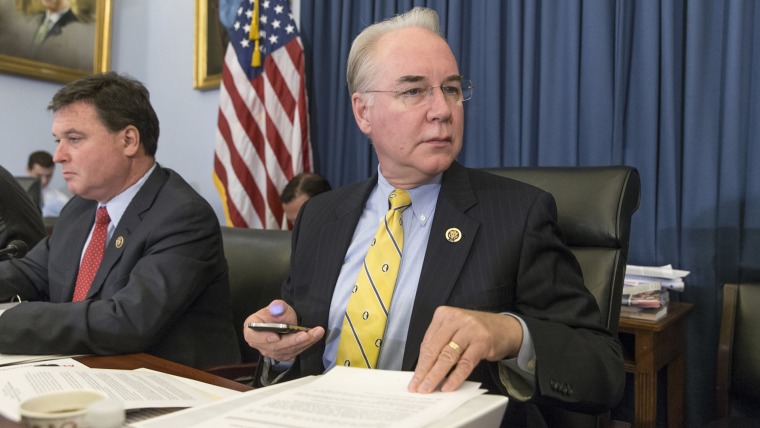Just on the surface, Rep. Tom Price's (R-Ga.) nomination to become the Secretary of Health and Human Services appears problematic. The far-right congressman has a radical approach to health policy; he's associated with fringe elements; and he's been a staunch critic of evidence-based policymaking.Making matters even more unusual, by some accounts, Donald Trump's transition team has kept Price out of the loop while officials work on the incoming administration's health-care reform package, so that he'll be "inoculated" during his confirmation hearings. In other words, Trump World doesn't want Price to have to answer questions about the policies he'd implement at HHS, so Trump aides have kept him deliberately in the dark.But below the surface, controversies like this one, as reported by CNN, keep popping up.
Price bought between $1,001 to $15,000 worth of shares last March in Zimmer Biomet, according to House records reviewed by CNN. Less than a week after the transaction, the Georgia Republican congressman introduced the HIP Act, legislation that would have delayed until 2018 a Centers for Medicare and Medicaid Services (CMS) regulation that industry analysts warned would significantly hurt Zimmer Biomet financially once fully implemented.Zimmer Biomet, one of the world's leading manufacturers of knee and hip implants, was one of two companies that would have been hit the hardest by the new CMS regulation that directly impacts the payments for such procedures, according to press reports and congressional sources.
And while that doesn't look good for Price, it looks even worse when one notes that the company's political action committee donated to the congressman's campaign after he worked on the bill that would benefit the company's finances.The timeline paints an unflattering picture: (1) Price buys Zimmer Biomet stock; (2) Price quickly introduces legislation that would benefit Zimmer Biomet; (3) Price receives a campaign contribution from Zimmer Biomet.A Price spokesperson told CNN the congressman did nothing wrong, and insisted the stock was purchased by way of a broker-directed account. It's an area of interest that's likely to get some scrutiny during his upcoming confirmation hearings.As is the larger pattern. The Wall Street Journal recently reported, for example, that Price "traded more than $300,000 in shares of health-related companies over the past four years while sponsoring and advocating legislation that potentially could affect those companies' stocks."Kaiser Health News, meanwhile, added last week that Price got "a sweetheart deal" on an investment opportunity from a foreign biotech firm.In a written statement, Senate Minority Leader Chuck Schumer (D-N.Y.) argued there's a "clear and troubling pattern" surrounding the Georgia Republican."The Office of Congressional Ethics needs to conduct an immediate and thorough investigation into these potential violations of the STOCK Act before Rep. Price's nomination moves forward," Schumer added. "This report and his previous trades cast serious doubt on whether Congressman Price is fit to hold the office of Secretary for Health and Human Services."It's been a foregone conclusion that Tom Price would be confirmed for HHS. This may be a good time to rethink those assumptions.
